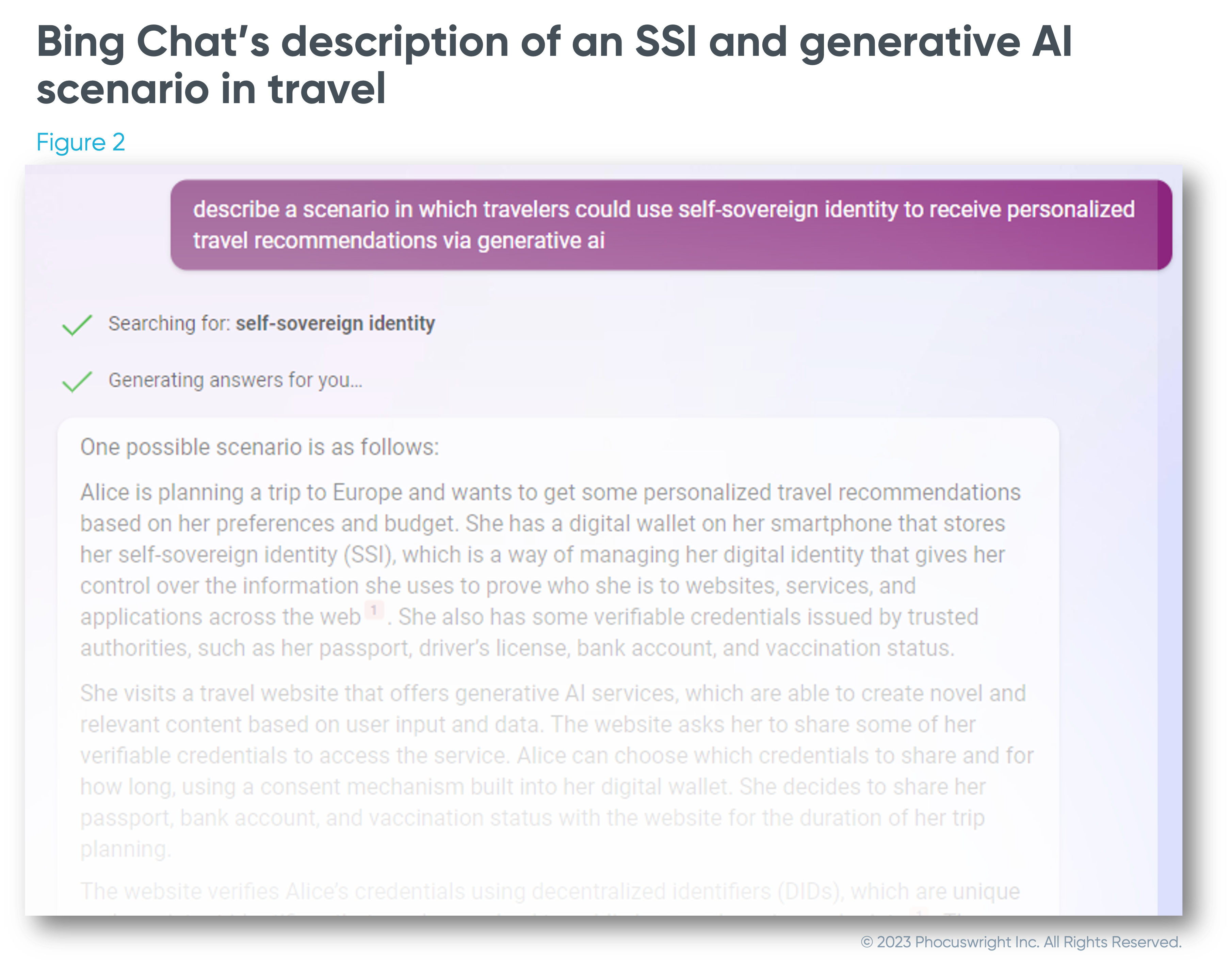Generative AI in every stage of consumer travel
A preview of Phocuswright's research report Generative AI: Transforming the Travel Cycle

The launch of ChatGPT 3.5 on November 30, 2022 dazzled users and captivated the tech world as it quickly became the fastest-growing consumer application of all time. After years of hype surrounding the potential of consumer-friendly artificial intelligence (AI), ChatGPT offered an extraordinary proof of concept that anyone could try. Following a series of high-profile AI chatbot failures and disappointments from other contenders, OpenAI’s ChatGPT was an exponential leap in the ability of AI to understand and create content accurately and impressively.
Since that initial launch, a lot has happened. OpenAI has released the fourth iteration (v. 4.0) of the multimodal (i.e., accepting text and image input) large language model on which ChatGPT is based. Companies including Google and Microsoft (the latter being a major OpenAI partner and investor) have launched competitive and complementary products. In February 2023 Microsoft released a new version of its Bing search engine that includes chat based on GPT-4, effectively turning it into an AI-powered real-time search engine connected to the internet with a conversational interface. Microsoft also launched a separate chat offering called Bing Chat which has the ability to browse the internet. In March 2023 Google launched its own chatbot, Bard, built on a version of the company’s own large language model LaMDA (Language Model for Dialogue Applications). Thus far, ChatGPT appears to be the most accurate of the mainstream offerings.
New competition continues to emerge. In February 2023 Meta announced its own large language model, LLaMA (which was subsequently leaked online), and in April Amazon launched Bedrock, a tool that lets software developers build and scale AI applications. Apple has been relatively quiet, but as the creator of Siri, you can bet they’re not sitting still. Meanwhile, a plethora of smaller competitors have stepped into the spotlight as well.
AI already serves our daily lives in everything from personalized recommendations to search engines, online advertising and navigation, albeit in ways that may not be obvious to end users. However, generative AI’s ability to converse in natural language and create original content in both text and multimedia form opens a vast new world of possibilities. This article surveys potential applications of generative AI through each stage of the travel cycle, from inspiration to booking and sharing, as well as promising uses in business operations.
Generative AI in Every Stage of Consumer Travel

The full report gives an in-depth analysis into each of the stages of travel. Get the report here.
Inspiration
Personalized destination recommendations
Generative AI can power new ways of discovering destinations and activities. A generative AI inspiration tool can offer tailored suggestions that align with travelers’ interests and desires. An AI model can additionally account for the traveler’s budget constraints. Further, multimodal generative AI models could enable new types of explorations.
Figure 1 in the full report is an example of how Bing Chat, which is connected to the internet and uses GPT-4, handled a detailed request for destination recommendations.

Content generation
Content could potentially be personalized to the individual traveler based on interactions with the AI paired with SSI or other personal data. As described in Phocuswright’s Self-Sovereign Identity: Unlocking Seamless Travel, SSI solutions allowing the customer to control their personal data and easily decide what types of data to share with travel providers (e.g., address, preferences, loyalty programs, travel credentials) could provide valuable input for generative AI products to instantly personalize content to the traveler’s preferences.
Once again, turning to generative AI itself enables a fairly robust understanding of the SSI scenario (see Figure 2).
Virtual reality/3D tours
Further in the future, generative AI could be used to create realistic and immersive virtual worlds which provide travelers with previews of customized experiences.

Planning

AI-generated itineraries

Multilingual assistance

Chatbots
Shopping/Booking
- Travel search/booking engines
- New intermediaries?
The full report gives a real-world example of a long conversation with Generative AI.

Experiencing
- Digital concierges
- Autonomous vehicles
Sharing

- AI-enhanced content
- Personalized storytelling
Generative AI in Business Operations

Marketing and Sales
- Advertising, Discoverability and the new SEO
- Generating and optimizing copy
- Sentiment analysis

Customer Service
- Guest communication
- Agent productivity
Other Use Cases
- Optimization of backend processes
- Business travel
- New distribution capability (NDC) meets AI
What’s Next?

The launches of ChatGPT, Bard and similar generative AI solutions mark a substantial step forward in travel planning and business process optimization. And in the long term, generative AI is likely to have broad-reaching impacts across all areas of travel. How quickly will the technology advance from here? How will potential pitfalls be addressed? What will the travel industry look like in five years, or even in one year, given the rapid impact and pace of change we’re already seeing with generative AI? It’s impossible to say for sure, but we know a few good chatbots you can ask.
This article is part of a content series that explores some of the most impactful innovation and technology-driven trends that will influence the travel industry in 2023 and beyond.
Also available are these reports:
- The Future of Social Media, Influencers and Social Commerce in Travel
- Roundup: Web3 Is Proving Itself in Travel
- Green Travel Innovation Now (Yes, Now!)
- No Travel Experience Necessary: More Outsiders Enter the OTA Market
- Generative AI: Transforming the Travel Cycle
- Real-Time Revolution in Hotel Operations
- eVTOLs in Travel: Viable Addition or Flights of Fancy?
- Super Apps’ Secret Sauce
Watch the online event that covered each trend, presented by Phocuswright analysts:




WEEKLY RESEARCH INSIGHTS
We dig deep to give you the data and trends that drive the travel, tourism and hospitality industry.
Get the latest in travel industry highlights with our free weekly research articles and more. Sign up to get the latest delivered directly to your inbox.
FOR MORE INSIGHTS
See all of Phocuswright's free research insights here.
Sign up to get the latest delivered directly to your inbox.
Open Access Research Subscription

Research is our priority. Our Open Access research subscription puts the world’s most comprehensive library of travel research and data visualization at your fingertips.
Clients have relied on Phocuswright's deep industry knowledge for over 25 years to power great decisions, help justify a pitch, build a strategic plan and elevate any presentation through trusted research and data. When companies and executives reference Phocuswright, they gain the trust of an industry keen on data, trends and analytics.
See the full benefits of an Open Access subscription here.

